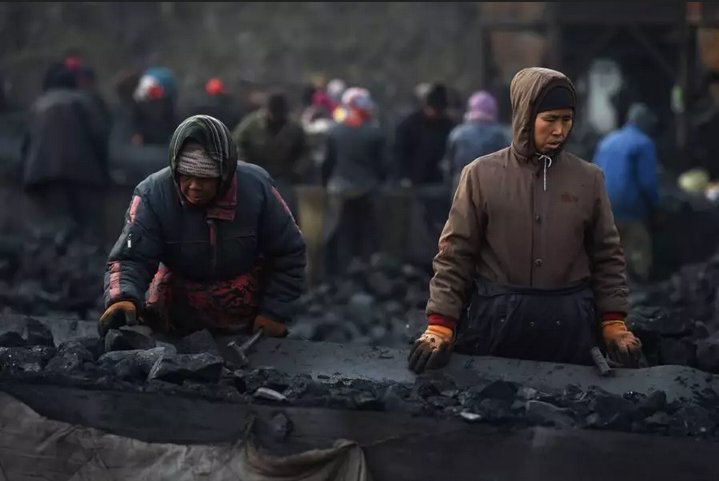We publish an unofficial translation of an article by A Nova Democracia (AND).
China: Ten workers killed in coal mine collapse

Coal miners face exploitation, illegal working conditions and frequent hazards. Photo: AFP/Jiji
A collapse in a coal mine in the city of Baiyin in northwest China's Gansu province killed 10 workers and injured seven others. The collapse occurred at about 11:15 a.m. local time on 23 July. The surviving workers said they were walking through the mine when a mountain collapsed, burying the workers and their vehicles. No information about the company responsible for the mine has been released.
Deaths among miners are relatively common in China, largely due to the heavy exploitation of workers and weak health and safety regulations. In January 2021, an accident at the Hushan mine in Qixia, Shandong province, killed 10 workers. In September of the same year, 19 workers were killed in northwest China's Qinghai province. In March 2022, 22 workers died in a coal mine in Ghizou province, southwest China.
60 % of China's electricity is generated from coal. In 2022, China's fascist state ordered domestic producers to increase their production capacity to 300 million tonnes per year. At the end of 2021, amid an energy crisis in the country, the government instructed companies to "produce as much as possible". In this scenario, miners are constantly exposed to maximum exploitation and extremely risky working conditions.
Social imperialism is responsible for the death of the workers
In order to avoid responsibility for the deaths of workers in the mining sector, China's social-fascist state claims that a large proportion of these accidents occur in illegal mines. However, this statement ignores the high death rates of workers at legal sites, such as the recent incident at the Bayin mine. There are also widespread reports of the involvement of the social fascist Chinese state itself in illegal mining sites through corruption and bribery.
There are recurrent cases of illegal mining in China involving government officials, as in the case of Wen Guodong, the deputy governor of Qinghai, who received more than $16 million in bribes from construction groups, mining companies and businessmen between 2009 and 2020. Similarly, in the case of Mayor Zheng Zhongsheng, who received around 786 million rupees due to corruption practices in the coal mining sector.
These corruption cases, which involve bribing members of the Chinese government, occur to prevent illegal sites from being inspected and even to favour certain companies. They pay politicians to get their coal mining or processing projects approved or moved to better mining sites.
Many politicians even benefit directly from the companies' profits, and it is not uncommon for politicians to also be big tycoons who either hold positions in mining companies or invest in the sector. In addition to the corruption practices in the operation of the plants, there are numerous cases of mining magnates hiding bodies and altering or destroying the evidence of industrial accidents. This was the case with the 2005 accident at the Jiajiapu coal mine in Shanxi province, where 17 bodies of 39 workers killed in an explosion were moved to another city to hide the actual number of deaths. In 2010, in a methane gas explosion that killed 26 workers, four bodies were hidden in a shed by the mine manager.
Far from being isolated cases, as the reactionary president Xi Jinping tries to assert with his "anti-corruption" projects, this astonishing scenario of exorbitant profits accumulated through the exploitation and death of workers is the precondition for the perpetuation of the endemic corruption of the social-imperialist Chinese state. This reality has been developing since 1976, when the revisionist clique of Teng Siaoping overthrew the Chinese Communist Party, arrested and murdered the revolutionary cadres and the most progressive sections of the popular masses, and began the capitalist restoration of the country. With the restoration, the Chinese Communist Party and the state-owned enterprises, which served the people during the period of the People's Republic of China (1949-1976), have turned into instruments of the Chinese monopolist and imperialist bourgeoisie, which uses its positions in the fascist Chinese state for the benefit of its own investments in the monopolist state-owned enterprises.










